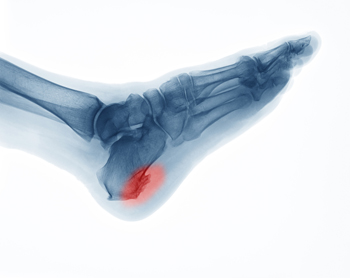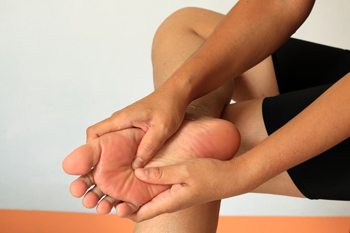






Research has shown that for every mile walked, there are sixty tons of stress that goes through the foot. Heel pain can indicate a heel spur may have developed and can become worse without proper treatment. It is defined as a bony growth that forms at the base of the heel and can cause severe pain and discomfort. This condition can come from standing on your feet for most of the day, or from wearing shoes that do not fit correctly. Some patients find it helpful to practice specific stretching exercises, and this may help them to find mild relief. Additionally, when proper stretches are performed, it may give the foot the ability to have increased range of motion and flexibility. Obese patients may find it beneficial to lose extra pounds and wearing heel pads may provide temporary relief from the heel spur. If you have developed this ailment, it is suggested that you are under the care of a podiatrist who can properly treat heel spurs.
Heel spurs can be incredibly painful and sometimes may make you unable to participate in physical activities. To get medical care for your heel spurs, contact one of our podiatrists from Active Foot and Ankle Care, LLC. Our doctors will do everything possible to treat your condition.
Heels Spurs
Heel spurs are formed by calcium deposits on the back of the foot where the heel is. This can also be caused by small fragments of bone breaking off one section of the foot, attaching onto the back of the foot. Heel spurs can also be bone growth on the back of the foot and may grow in the direction of the arch of the foot.
Older individuals usually suffer from heel spurs and pain sometimes intensifies with age. One of the main condition's spurs are related to is plantar fasciitis.
Pain
The pain associated with spurs is often because of weight placed on the feet. When someone is walking, their entire weight is concentrated on the feet. Bone spurs then have the tendency to affect other bones and tissues around the foot. As the pain continues, the feet will become tender and sensitive over time.
Treatments
There are many ways to treat heel spurs. If one is suffering from heel spurs in conjunction with pain, there are several methods for healing. Medication, surgery, and herbal care are some options.
If you have any questions feel free to contact our offices located in Fair Lawn, Riverdale, and Englewood, NJ . We offer the latest in diagnostic and treatment technology to meet your needs.
 Many people with diabetes, especially those over 55 years old, develop a condition known as peripheral neuropathy. It affects nerves in the outer portion of the body, rather than in the heart and central core. A common symptom of peripheral neuropathy is a feeling of pins and needles, combined with shooting pain in the feet. You may also feel a loss of balance, lack of coordination, and muscle weakness. In addition, neuropathy may also cause sores on your feet to take a long time to heal. Diabetes is thought to be a major cause of peripheral neuropathy, the result of continual high blood sugar levels that damage the nerves. Other causes include direct injury to the nerves, a viral infection (such as shingles), a side-effect of some medications, smoking, and drinking too much alcohol. If you have diabetes or are experiencing any of the above symptoms, it is a good idea to develop an ongoing relationship with a podiatrist for a diagnosis, continued monitoring, and treatment specific to your case.
Many people with diabetes, especially those over 55 years old, develop a condition known as peripheral neuropathy. It affects nerves in the outer portion of the body, rather than in the heart and central core. A common symptom of peripheral neuropathy is a feeling of pins and needles, combined with shooting pain in the feet. You may also feel a loss of balance, lack of coordination, and muscle weakness. In addition, neuropathy may also cause sores on your feet to take a long time to heal. Diabetes is thought to be a major cause of peripheral neuropathy, the result of continual high blood sugar levels that damage the nerves. Other causes include direct injury to the nerves, a viral infection (such as shingles), a side-effect of some medications, smoking, and drinking too much alcohol. If you have diabetes or are experiencing any of the above symptoms, it is a good idea to develop an ongoing relationship with a podiatrist for a diagnosis, continued monitoring, and treatment specific to your case.
Neuropathy
Neuropathy can be a potentially serious condition, especially if it is left undiagnosed. If you have any concerns that you may be experiencing nerve loss in your feet, consult with one of our podiatrists from Active Foot and Ankle Care, LLC. Our doctors will assess your condition and provide you with quality foot and ankle treatment for neuropathy.
What Is Neuropathy?
Neuropathy is a condition that leads to damage to the nerves in the body. Peripheral neuropathy, or neuropathy that affects your peripheral nervous system, usually occurs in the feet. Neuropathy can be triggered by a number of different causes. Such causes include diabetes, infections, cancers, disorders, and toxic substances.
Symptoms of Neuropathy Include:
Those with diabetes are at serious risk due to being unable to feel an ulcer on their feet. Diabetics usually also suffer from poor blood circulation. This can lead to the wound not healing, infections occurring, and the limb may have to be amputated.
Treatment
To treat neuropathy in the foot, podiatrists will first diagnose the cause of the neuropathy. Figuring out the underlying cause of the neuropathy will allow the podiatrist to prescribe the best treatment, whether it be caused by diabetes, toxic substance exposure, infection, etc. If the nerve has not died, then it’s possible that sensation may be able to return to the foot.
Pain medication may be issued for pain. Electrical nerve stimulation can be used to stimulate nerves. If the neuropathy is caused from pressure on the nerves, then surgery may be necessary.
If you have any questions, please feel free to contact our offices located in Fair Lawn, Riverdale, and Englewood, NJ . We offer the newest diagnostic and treatment technologies for all your foot care needs.
Stress fractures are tiny hairline cracks in the bone, usually the result of overuse common in runners, athletes, and people who spend a great deal of time on their feet. Four main types of stress fractures are navicular, calcaneal, metatarsal and Jones. Each targets a different area of the foot and is brought on by different activities. The navicular stress fracture is often caused by sprinting or jumping. The pain occurs on the top inside arch area of the foot. A calcaneal stress fracture occurs in the heel bone (calcaneus), often found in runners, soldiers, or anyone who marches long distances. A metatarsal stress fracture occurs in one of the long bones in the foot (metatarsals) that connect the toes with the heels. It is usually brought on by overuse or poor biomechanics of the foot and is common in runners, dancers and gymnasts. A Jones stress fracture is specific to the 5th metatarsal, the outermost on the foot. It can be caused by turning over on the side of the foot and affects the end of the bone closest to the ankle. Any of these fractures can be painful and take time to heal. If you think you may have developed a stress fracture, it is a good idea to see a podiatrist as soon as possible for a full diagnosis and options for treatment.
Activities where too much pressure is put on the feet can cause stress fractures. To learn more, contact one of our podiatrists from Active Foot and Ankle Care, LLC. Our doctors can provide the care you need to keep your pain free and on your feet.
Dealing with Stress Fractures of the Foot and Ankle
Stress fractures occur in the foot and ankle when muscles in these areas weaken from too much or too little use. The feet and ankles then lose support when walking or running from the impact of the ground. Since there is no protection, the bones receive the full impact of each step. Stress on the feet can cause cracks to form in the bones, thus creating stress fractures.
What Are Stress Fractures?
Stress fractures occur frequently in individuals whose daily activities cause great impact on the feet and ankles. Stress factors are most common among:
Symptoms
Pain from the fractures occur in the area of the fractures and can be constant or intermittent. It will often cause sharp or dull pain with swelling and tenderness. Engaging in any kind of activity which involves high impact will aggravate pain.
If you have any questions please feel free to contact our offices located in Fair Lawn, Riverdale, and Englewood, NJ . We offer the newest diagnostic and treatment technologies for all your foot and ankle needs.
 “Hyperhidrosis,” or excessive sweating, can impact the feet. Feet can sweat for a variety of reasons, such as heat, vigorous exercise, pregnancy, shoes that do not fit properly, stress, overuse of feet, side effects of certain medications, or an underlying medical condition like diabetes or thyroid disease. When foot sweat is not cleaned up it can get trapped between toes, which can allow bacteria to grow and enter a cut or ingrown toenail, become infected, and lead to smelly feet (also known as “Bromodosis”). It makes good sense to wash and dry the feet regularly, as well as to wear proper footwear. Additional at home remedies can include foot powders and antiperspirants or medicated insoles. People more apt to develop these types of foot infections are seniors, diabetics, those undergoing hormonal changes (like in pregnancy), and those with compromised immune systems. Such infections must be tended to immediately. If your feet continue to sweat and smell and regular foot hygiene measures do not solve the problem, or if you notice an infection festering, a visit to a podiatrist is suggested for proper diagnosis, a better understanding of the root cause of the problem, and more aggressive treatment.
“Hyperhidrosis,” or excessive sweating, can impact the feet. Feet can sweat for a variety of reasons, such as heat, vigorous exercise, pregnancy, shoes that do not fit properly, stress, overuse of feet, side effects of certain medications, or an underlying medical condition like diabetes or thyroid disease. When foot sweat is not cleaned up it can get trapped between toes, which can allow bacteria to grow and enter a cut or ingrown toenail, become infected, and lead to smelly feet (also known as “Bromodosis”). It makes good sense to wash and dry the feet regularly, as well as to wear proper footwear. Additional at home remedies can include foot powders and antiperspirants or medicated insoles. People more apt to develop these types of foot infections are seniors, diabetics, those undergoing hormonal changes (like in pregnancy), and those with compromised immune systems. Such infections must be tended to immediately. If your feet continue to sweat and smell and regular foot hygiene measures do not solve the problem, or if you notice an infection festering, a visit to a podiatrist is suggested for proper diagnosis, a better understanding of the root cause of the problem, and more aggressive treatment.
If you are suffering from hyperhidrosis contact one of our podiatrists of Active Foot and Ankle Care, LLC. Our doctors can provide the care you need to attend to all of your foot and ankle needs.
Hyperhidrosis of the Feet
Hyperhidrosis is a rare disorder that can cause people to have excessive sweating of their feet. This can usually occur all on its own without rigorous activity involved. People who suffer from hyperhidrosis may also experience sweaty palms.
Although it is said that sweating is a healthy process meant to cool down the body temperature and to maintain a proper internal temperature, hyperhidrosis may prove to be a huge hindrance on a person’s everyday life.
Plantar hyperhidrosis is considered to be the main form of hyperhidrosis. Secondary hyperhidrosis can refer to sweating that occurs in areas other than the feet or hands and armpits. Often this may be a sign of it being related to another medical condition such as menopause, hyperthyroidism and even Parkinson’s disease.
In order to alleviate this condition, it is important to see your doctor so that they may prescribe the necessary medications so that you can begin to live a normal life again. If this is left untreated, it is said that it will persist throughout an individual’s life.
A last resort approach would be surgery, but it is best to speak with your doctor to find out what may be the best treatment for you.
If you have any questions please feel free to contact our offices located in Fair Lawn, Riverdale, and Englewood, NJ . We offer the newest diagnostic and treatment technologies for all your foot and ankle needs.






